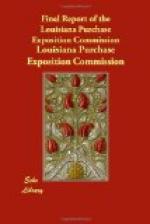satisfying American claims. “Those,”
says the French negotiator, Marbois, “who
knew the importance of a good understanding between
these two countries, attached more importance to the
$4,000,000 set apart for American claims than to
the $12,000,000 offered to France.”
An impending war in Europe, the possibilities of an occupation of Louisiana by a foreign power was not, either, the main motive. In the council held at the Tuileries on Easter day, 1803, the Marshal and Prince of Wagram, Berthier, whose first war had been the war of American independence, said, as to this: “If Louisiana is taken from us by our rivals what does it matter? Other possessions would soon be in our hands, and by means of an exchange, we should quickly obtain a restitution.” He concluded, “No navy without colonies, no colonies without a navy.”
Add again that the value of Louisiana was much better understood than it had been before. “I know the worth of what I give up,” said Bonaparte; and the French Government knew it indeed. They acted with open eyes, for they had taken care from the year 1800 to gather all available information. One of the memoirs with which they enlightened themselves had been asked of Louis Vilemont, former captain in the regiment of Louisiana. It is still unpublished; and it informed the Government that “from various reports of Canadian and Indian hunters it is possible to walk from Missouri to the sea in less than two months and a half.”
An access to the Pacific was not so easy as now, but yet an access was practicable, and the wealth of the country was extraordinary. Warming at the souvenir of what he knew, the retired officer exclaimed, “What sources of wealth can we not expect to find in those parts! At each step made from east to west all produce, all things increase tenfold. It seems as if nature had made this corner of the globe the most favored one of our immense empire. The samples of all reigns have more beauty and majesty than anywhere else. The men born there look more like the descendants of Alcides than the kinsmen of the tribes who worship Manitou.”
The main motive power, without which all the others would have been of no avail, was, indeed, mutual sympathy. When the treaty was signed the three negotiators, Barbe-Marbois, Monroe, and Livingston, who had known each other in America at the time of the war of Independence, rose, and, what is rare on such occasions, one of them was able to express in a single sentence the intimate feelings of the three. “The treaty which we have just signed,” said Livingston, “will cause no tears; they prepare centuries of happiness to innumerable generations of human beings; from this day the United States take their place among the powers of the first rank.”
I do not think that there is another example in the history of the world of a cession of such vast territories thus obtained by the




